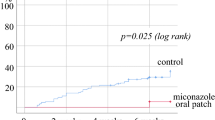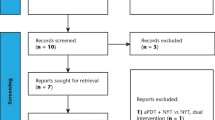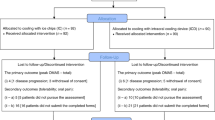Abstract
The aim of this study was to see if antibiotic pastilles could reduce radiation mucositis, pain, dysphagia and weight loss in patients undergoing radical radiotherapy for head and neck cancer. A total of 275 patients with T1-T4 tumours entered the study; 136 were allocated to suck four times daily a pastille containing amphotericin, polymyxin and tobramycin. The remaining 139 patients received an identical placebo. In all, 54 patients were unevaluable (24 active, 30 placebo). Bacteriological monitoring was carried out before and twice weekly during treatment. Both arms of the study were well balanced for T and N stage, age, sex and radiation dose (60 Gy). There was a slight imbalance in the site of disease which had no substantive effect on the results. The primary study end point was the percentage of patients who developed intermediate or thick pseudomembranes. No statistically significant difference was found in this end point, with 36% of patients in the active arm developing this type of membrane compared with 48% in the placebo arm (P = 0.118). The estimated odds ratio (placebo/active) of developing an intermediate or thick pseudomembrane was 1.59 (95% CI 0.89-2.82). However a more sensitive test comparing the worst recorded mucositis grade between the two arms was statistically significant (P = 0.009). This indicated that the active pastilles had a beneficial effect, but the magnitude was probably smaller than the trial was designed to detect. There was a reduction in mucositis distribution (P = 0.002), mucositis area (P = 0.028), dysphagia (P = 0.006) and weight loss (P = 0.009) in the active arm. There was a clear tendency for patients with positive cultures for aerobic Gram-negative bacteria (AGNB) (P = 0.003) and yeasts (P = 0.026) during treatment to have more severe mucositis. The active pastilles reduced the percentage of patients with yeast cultures (P = 0.003) but had less effect on AGNB. The benefit derived from the pastilles should materially increase patient tolerance to radical radiotherapy for head and neck cancer.
This is a preview of subscription content, access via your institution
Access options
Subscribe to this journal
Receive 24 print issues and online access
$259.00 per year
only $10.79 per issue
Buy this article
- Purchase on Springer Link
- Instant access to full article PDF
Prices may be subject to local taxes which are calculated during checkout
Similar content being viewed by others
Author information
Authors and Affiliations
Rights and permissions
About this article
Cite this article
Symonds, R., McIlroy, P., Khorrami, J. et al. The reduction of radiation mucositis by selective decontamination antibiotic pastilles: a placebo-controlled double-blind trial. Br J Cancer 74, 312–317 (1996). https://doi.org/10.1038/bjc.1996.359
Issue Date:
DOI: https://doi.org/10.1038/bjc.1996.359
This article is cited by
-
Pathogenesis and Amelioration of Radiation-Induced Oral Mucositis
Current Treatment Options in Oncology (2022)
-
Radiotherapy-Specific Chronic Pain Syndromes in the Cancer Population: An Evidence-Based Narrative Review
Advances in Therapy (2021)
-
Radiation induced oral mucositis: a review of current literature on prevention and management
European Archives of Oto-Rhino-Laryngology (2016)
-
The Impact of Dairy Consumption on Salivary Inoculum
Dysphagia (2014)
-
Systematic review of antimicrobials, mucosal coating agents, anesthetics, and analgesics for the management of oral mucositis in cancer patients
Supportive Care in Cancer (2013)



